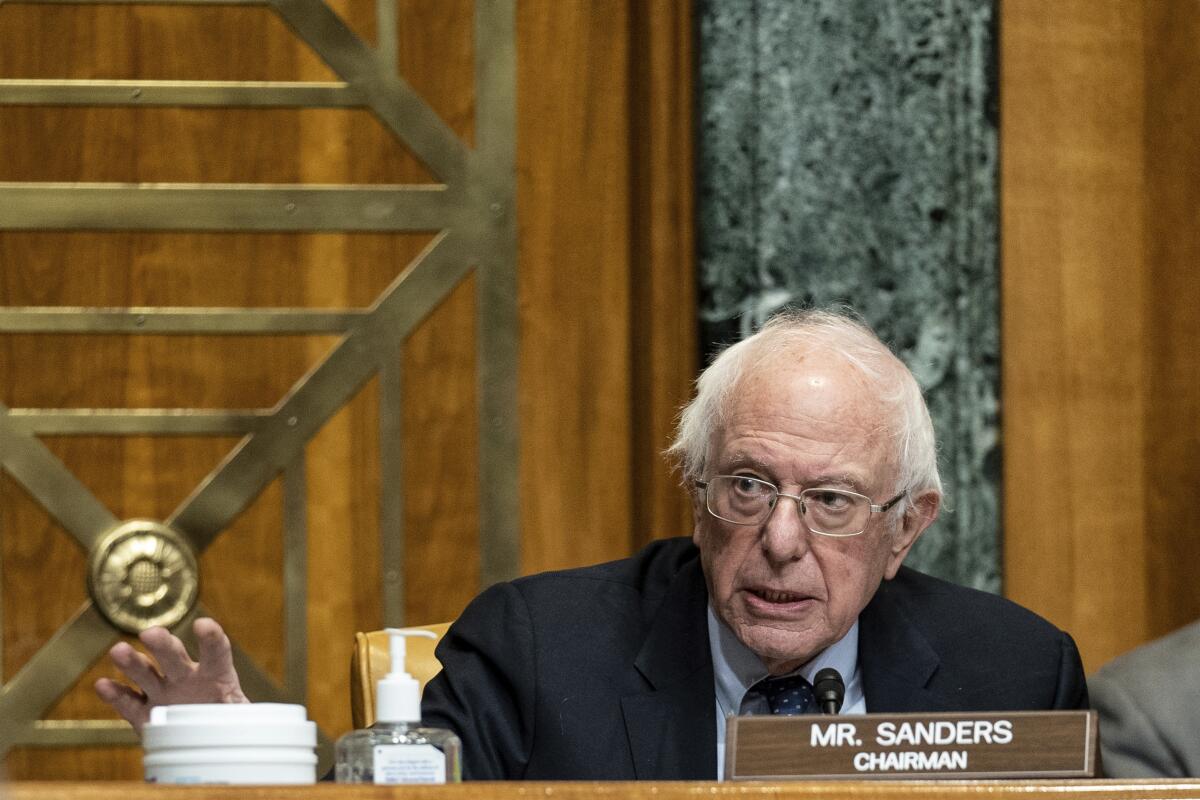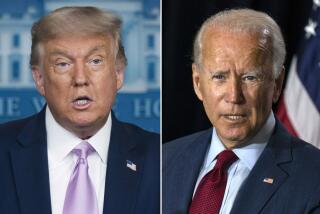Democrats to seek citizenship pathway for immigrants in infrastructure bill, Sanders says

- Share via
WASHINGTON — Senate Democrats plan to include a pathway to citizenship for certain immigrants in the country illegally as part of the sweeping infrastructure bill they hope to enact on a partisan basis this year.
Senate Budget Committee Chairman Bernie Sanders (I-Vt.), whose committee would start the process of crafting a bill, confirmed Tuesday that it would include a pathway to citizenship, but said Democrats are still determining who would be covered.
“We’re working on that right now,” Sanders said.
An early draft would call for $150 billion to go toward immigration policies, including the path to citizenship and some border security, according to a document circulating on Capitol Hill.
Comprehensive immigration reform, including a path to citizenship, has bedeviled Congress and lawmakers of both parties for four decades. On several occasions, bipartisan groups have formed, stirring the hopes of immigrant populations, only to have those efforts fall apart. Immigration advocates are demanding that President Biden and Democrats — armed with majorities, albeit slim, in both houses of Congress — not waste the opportunity to enact meaningful change.
“Democrats stand to gain a lot politically with Latinos in particular if they actually get this done,” said Sergio Gonzales, executive director of the advocacy group the Immigration Hub. “But the inverse is true as well: If it doesn’t actually get done this year, I think it’s going to be a major problem for Democrats going into the midterms.”
The Biden administration will begin a delayed second phase of winding down Trump’s controversial immigration policy.
Biden and congressional Democrats have not yet determined how they will enact an infrastructure plan and are still negotiating with Republicans over a bipartisan proposal.
But as those talks take far longer than expected, Democrats are also starting the process of pursuing a partisan bill that would address several of their top priorities, such as climate, immigration and healthcare. Several progressives say they wouldn’t support a bipartisan plan without assurance that Democrats would follow up with the partisan bill.
Longtime advocates of immigration reform see the partisan process as the only reasonable vehicle to address immigration policy in a sharply divided Senate. Separate bipartisan talks about a pathway to citizenship combined with enhanced border security are in their early stages, according to several Republicans involved in the talks.
“We prefer a bipartisan agreement even if it’s not everything we’d like to see,” said Sen. Robert Menendez (D-N.J.), who has introduced a comprehensive immigration bill. “But in the absence of doing that, then those of us who believe in immigration reform feel that we have to at least pursue this option and see if it’s viable.”
Advocates view the partisan bill as an opportunity to enact a pathway without having to agree to increased border and rule enforcement, the price tag Republicans have insisted upon in prior attempts at a compromise.
“One of the things that is appealing to people that have fought and lost these battles is that it would be in the hands of Democrats and it could be a clean provision — not chunked up with all kinds of border provisions,” said Doris Meissner, a senior fellow at the Migration Policy Institute.
Still the Democrats’ path is fraught. The partisan process, called reconciliation, allows Democrats to skirt a Republican filibuster and enact legislation with a simple majority.
But it comes with downsides: It would need support from all 48 Senate Democrats and the two independents who caucus with them. It is far from certain that moderate Democrats would agree to a broad path to citizenship without addressing border security.
Rep. Raul Ruiz (D-Palm Desert), chairman of the Congressional Hispanic Caucus, acknowledged that some moderate Democratic senators may have to be convinced to support a path to citizenship, especially a broad one.
But he predicted that getting a bill through the House first would present “a very strong chance that all Democratic senators would vote for the budget reconciliation that includes an augmentation to our revenues and a boost to our economy by allowing a pathway to citizenship for undocumented workers, DACA recipients and TPS holders.”
Legislation approved through reconciliation also has to have a direct impact on the budget and the Senate parliamentarian will go through the bill line by line to determine whether it does.
Immigration advocates say a pathway to citizenship would qualify, leaning on a 2005 parliamentarian’s ruling that policy related to green cards could be allowed in a bill.
“What’s critical for us, is it overcame and passed the procedural test to be considered in the first place,” said Carlos Guevara, director of immigration policy at the advocacy organization UnidosUS. “Our goal right now is to ensure there is enough space to work with, if we move into that process, to get the greatest amount of people protected.”
A recent study by the liberal think tank the Center for American Progress found that setting up a pathway to citizenship would have a sizable budgetary impact by increasing the U.S. GDP by $1.7 trillion over a decade, raising wages for all Americans and creating hundreds of thousands of new jobs.
Others are more skeptical that the complex reconciliation requirements — known as the “Byrd rule” for its author, former Sen. Robert C. Byrd — would allow for it.
“I think they’re dreaming when they think they can use reconciliation on substantive legislation like this,” said Sen. John Cornyn (R-Texas), who has been working on the bipartisan immigration proposal. “I know they’re frustrated and want to use every tool available, but I can’t imagine they can get by the Byrd rule.”
Democrats involved in the early talks say their goal would be to grant a pathway to citizenship for as many of the estimated 11 million immigrants here illegally as possible. “As much as we think we can accommodate given the parliamentarian’s role,” said Sen. Alex Padilla (D-Calif.). “It’s not a done deal, it’s the beginning of the process.”
A pathway of citizenship would almost certainly be included for the so-called Dreamers, participants in the Deferred Action for Childhood Arrivals, or DACA. The executive action by President Obama allowed 700,000 people brought here illegally as children to live without threat of deportation.
Less known is how much further the policy would go to extending the pathway to people living with Temporary Protected Status, farmworkers and front-line essential workers. Democrats involved in the process say those conversations are ongoing and would likely be subject to further negotiation among Democrats.
While there are House-passed bills that create a pathway to Dreamers, TPS holders and farmworkers, advocates are drafting backup plans in case those bills cannot be directly inserted into the infrastructure bill.
For instance, UnidosUS is looking into whether lawmakers could modify a dormant provision of immigration law that allowed certain eligible people who were in the country illegally to pay a fine and get on a path to citizenship without having to leave the country, a significant hurdle for many people, Guevara said.
“There are many ways to skin the proverbial cat,” he said.
More to Read
Get the L.A. Times Politics newsletter
Deeply reported insights into legislation, politics and policy from Sacramento, Washington and beyond. In your inbox three times per week.
You may occasionally receive promotional content from the Los Angeles Times.













